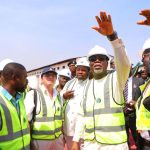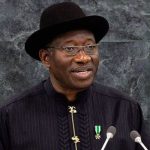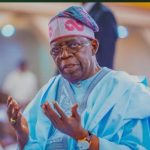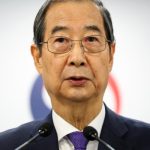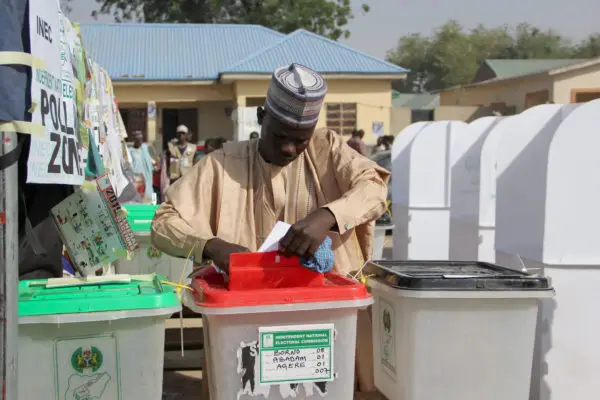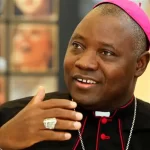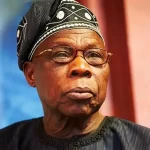By Clifford Ndujihe
THE outcome of last Saturday’s Presidential and National Assembly elections are still raising dust in the polity. For the first time since 1979, three presidential candidates ran neck-to-neck. The Independent National Electoral Commission, INEC, on Wednesday declared Asiwaju Bola Tinubu of the All Progressives Congress, APC, as president-elect. He won a very tight race.
Tinubu polled 8,794,726 votes to beat his closest challenger, Alhaji Atiku Abubakar, of the Peoples Democratic Party, PDP, who got 6,984,520 votes.
Both Tinubu and Atiku won 12 states each.
The Labour Party, LP, Candidate, Mr. Peter Obi, polled 6,101,533 votes to place a close third. He also won 11 states and the FCT.
Former Governor of Kano State and New Nigeria Peoples Party, NNPP, Candidate, Senator Rabiu Kwankwaso, came fourth with 1,496,687 votes and won his native Kano State.
Keen poll
Tinubu won Ekiti, Kwara, Ondo, Oyo, Ogun, Jigawa, Niger, Benue, Kogi, Borno, Zamfara and Rivers states.
Atiku prevailed in Osun, Yobe, Gombe, Adamawa, Katsina, Akwa Ibom, Bauchi, Bayelsa, Kaduna, Kebbi and Sokoto states.
Obi had the upper hand in Abia, Anambra, Ebonyi, Imo, Delta, Cross River Lagos, Edo, Enugu, Plateau, Nasarawa and Federal Capital Territory, FCT, Abuja.
How presidential/NASS polls altered calculations
Although, the outcome of the presidential poll is being disputed by Atiku and Obi, who have vowed to seek redress in court and are already doing so, the election has altered Nigeria’s political plate tectonics.
Many political heavy weights suffered crushing defeats at the polls. No fewer than 20 governors could not deliver their states in the presidential election. Many of them lost their bids to go the Senate. Many senators and members of the House of Representatives were roundly beaten by political greenhorns.
For the first time since 1999, the new National Assembly will have eight parties represented. In the 10th Senate, there will be seven parties while the 10th House of Representatives will have eight parties.
Currently, 325 of the 360 House of Representatives slots have been taken with the APC cornering 162. The PDP has 102; LP, 34; NNPP, 18, Social Democratic Party, SDP, 2; and Young Progressive Party, YPP, 1
In the Senate, 98 of the 109 seats have been won with the APC leading with 57 slots, PDP- 27, LP -7, NNPP- 3, SDP -2, YPP-1, and APGA -1.
The shocking results have been attributed to the kind of campaigns carried out by the four leading candidates especially Peter Obi and Kwakwanso. Through them the LP and NNPP are enjoying their best run ever in the history of electioneering in Nigeria. In the 10th National Assembly, LP will have at least 41 members and the NNPP 21. The number may go up if they win more seats in the 46 (35 Reps, 11 Senate) supplementary elections that will be held on March 11.
Will Presidential/NASS polls affect gov polls?
Giving the Tsunami that trailed the February 25 polls, the polity is astir. Politicians have returned to the drawing board. The political careers of a host of them are on the line.
On Saturday, 28 governorship and 993 House of Assembly seats will be fought for.
There will be no governorship election in Anambra, Bayelsa, Edo, Ekiti, Ondo, Osun, Kogi and Imo on account of Supreme Court rulings that made their governors to assume on a date different from May 29.
Although, the governors of the seven states are not contesting election, will they deliver their parties’ candidates at the Assembly poll? Of the seven, the governors of Anambra and Edo could not deliver APGA and PDP respectively at the presidential poll.
Among the 28 states where governorship election will be held on Saturday, 10 are seeking for re-election while 18 are out-going.
Four of the 10 governors (Lagos, Oyo, Gombe and Nasarawa) seeking for re-election could not win their states for their presidential candidates.
In like manner but conversely, only four of the 18 out-going governors (Akwa Ibom, Bayelsa, Sokoto and Jigawa) generated victory for their parties in the presidential election. Although, Nyesom Wike is of the PDP, he reportedly worked for the APC in the presidential election because of his spat with Atiku Abubakar.
As the Nigerians go for the second round of 2023 general polls will the trend observed in the February 25 polls continue? Currently, only three parties-APC, PDP and APGA have governors. Will the number of parties with governors increase after the polls? Will governors who failed to deliver on February 25 deliver this time? Will those who delivered continue the winning streak or falter?
Answers to these questions and more will be known on March 11.
Govs seeking re-election
•Adamu Fintiri, PDP, Adamawa
•Bala Mohammed, PDP, Bauchi
•Babagana Zulum, APC, Borno
•Inuwa Yahaya, APC, Gombe
•Abdulrahman Abdulrasaq, APC, Kwara
•Dapo Abiodun, APC, Ogun
•Seyi Makinde, PDP, Oyo
•Babajide Sanwo-Olu, APC, Lagos
•Abdullahi Sule, APC, Nasarawa
•Bello Matawalle, APC, Zamfara
No gov poll
•Anambra
•Ekiti
•Ondo
•*Imo
•Kogi
•Bayelsa
•Edo
•Osun
Out-going governors
•Okezie Ikpeazu, PDP, Abia
•Udom Emmanuel, PDP, A/Ibom
•Samuel Ortom, PDP, Benue
•Ben Ayade, APC, Cross River
•Ifeanyi Okowa, PDP, Delta
•Dave Umahi, APC, Ebonyi
•Ifeanyi Ugwuanyi, Enugu
•Badaru Abubakar, APC, Jigawa
•Atiku Bagudu, APC, Kebbi
•Nasir el-Rufai, APC, Kaduna
•Umaru Ganduje, APC, Kano
•Bello Masari, APC, Katsina
Sani Bello, APC, Niger
•Simon Lalong, APC, Plateau
•Nyesom Wike, PDP, Rivers
•Darius Ishaku, PDP, Taraba
•Aminu Tambuwal, PDP, Sokoto
•Mai Mala Buni, APC, Yobe
Source: Vanguard

